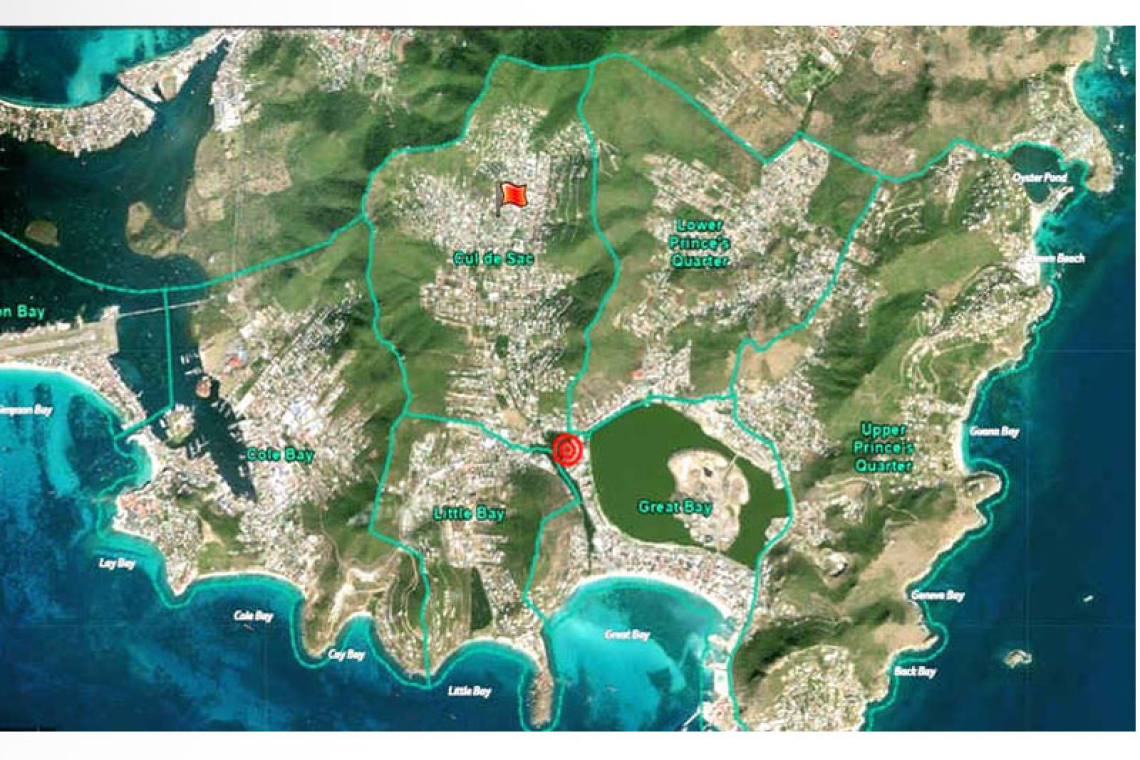The St. Maarten Wastewater Project SWAMP is envisioned to connect 720 households in the Cul de Sac basin to the public sewage system (see flag) leading to the A.Th. Illidge Road wastewater treatment facility (circle red).
PHILIPSBURG--On Wednesday, Minister of Public Housing, Spatial Planning, Environment and Infrastructure VROMI Patrice Gumbs announced the kick-off of the St. Maarten Wastewater Management Project SWAMP – a project that, according to official World Bank documents, has been active since last year.
“In mid-2024, the St. Maarten Trust Fund SXM TF had the St. Maarten Wastewater Management Project SWAMP, a US $10 million project, in its pipeline. It became effective in September 2024,” the 2024 semi-annual report of the St. Maarten Reconstruction, Recovery and Resilience Trust Fund states.
VROMI Minister Gumbs, in his opening remarks during Wednesday’s Council of Ministers’ press briefing, said, “We are pleased to announce the official kick-off of the St. Maarten Wastewater Management Project, commonly referred to as SWAMP, under the World Bank Recovery Trust Fund of St. Maarten. This is a major infrastructure project that will improve sanitation, protect public health and help preserve our environment.”
SWAMP is envisioned to deliver more than 700 new household connections for approximately 6,300 residents by 2028. “This is part of our official commitment in the results framework which target 720 households in total. SWAMP is a multi-year investment that will lay or rehabilitate around 15 kilometres (9 miles) of sewage lines, install household connections to the public sewage system, and upgrade the A.Th. Illidge Road wastewater treatment plant to handle the additional flow.”
Gumbs said the project is backed by a US $25 million investment, running from 2024 to 2028. “This includes a $10 million grant from the St. Maarten Trust Fund and $15 million comes in part from the government of St. Maarten,” Gumbs said.
He confirmed the previously publicised plans of the World Bank to focus on the Cul de Sac basin, with all 720 selected households being in that area. Only if the project is completed for less than the estimate, or if government manages to secure additional funds, the project may be extended towards Philipsburg.
“Right now, we are in the design phase,” said Gumbs, who informed that “only 15% of St. Maarten is currently connected to the existing sewage treatment plant” and that the project aims to “correct that, and enhance connectivity.”
According to a 2023 SWAMP draft document outlining Labor Management Procedures, “it is estimated that only approximately 23% of Gemeenschappelijk Electriciteitsbedrijf Bovenwindse Eilanden’s (GEBE’s) water customers in East St. Maarten have sewerage connections.” Existing public sewerage network coverage, the authors of the project concluded, “is severely limited, and covers only some districts and neighbourhoods of St. Maarten, leaving significant areas and percentage of population uncovered.”
In October 2024, the National Recovery Program Bureau (NRPB) was seeking the services of a hydraulic engineer to support NRPB with technical expertise on all construction-related activities under SWAMP, with a contract offered per January 1, 2025, as starting date.
Other contracts to be awarded under SWAMP – according to its draft Labor Management
Procedures – include a range of consultancy services aimed at supporting both the technical and institutional aspects of wastewater management.
A Civil Works Contractor will be engaged to implement network expansion, rehabilitation, and improvements to the wastewater treatment plant. A design and supervision firm will oversee project engineering, tender preparation, environmental and social assessments, and site supervision.
Additional consultancies will focus on capacity strengthening in VROMI, including technical training, organisational development, and stakeholder coordination. A policy advisor will analyse and enhance the legal and regulatory framework, including the introduction of wastewater tariffs.
Support will also be provided for the development of national water and sanitation strategies aligned with circular economy principles. To ensure effective environmental oversight, consultants will establish a standardised seawater and surface water monitoring system.
Finally, an independent sludge management expert will review project practices and provide recommendations to ensure environmental and social compliance throughout the project lifecycle.







